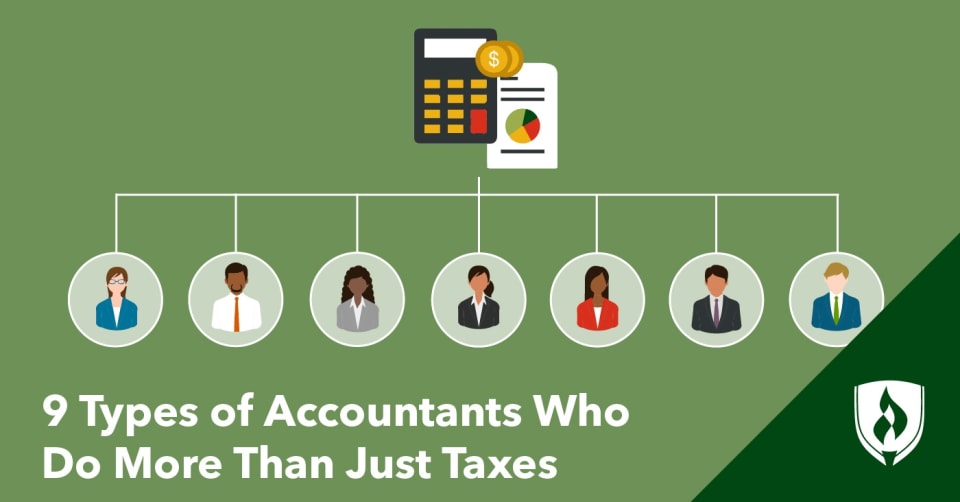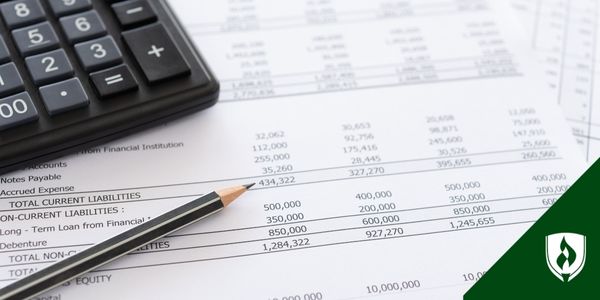
When you think of an accountant, whom do you picture? Many people may envision a somewhat-frazzled business professional tirelessly working to file their clients’ tax claims. For the average person, accountants and taxes often go hand-in-hand.
If that sounds like you, you might be surprised to learn that there are several different types of accountants out there—and that tax-related matters are often just a fraction of their work responsibilities. If you’d like to learn more about the accounting roles that branch out beyond getting on the right side of the tax man, you’re in the right place. We’ve compiled a list of accounting-related roles that you might not know about yet.
Keep reading to familiarize yourself with some of these potentially lesser-known accounting positions. Who knows? Your future job title might be featured in this list!
9 Different accounting jobs you may not know about
Ready to broaden your accounting career horizons? Start here to learn more about the variety of accounting-related jobs out there.
1. Certified Public Accountant
Certified Public Accountants (CPAs) are upper-level accountants who are recognized as experts in an organization’s accounting records, taxes and financial standing. While some of their work does involve taxes, their involvement tends to be more in-depth than just working with taxes.
A CPA’s role is that of a trusted advisor, helping their clients plan and meet their financial goals, while also assisting in other fiscal matters. This could include audits and reviews, forensic accounting, consulting and/or litigation services.
In order to become a CPA, you must first earn a Bachelor’s degree from an accredited Accounting program and obtain certification by passing the Uniform CPA Examination—a rigorous series of evaluations used to gauge your abilities in four key accounting focus areas.
2. Forensic accountant
Forensic accountants are the detectives of the accounting world. These professionals analyze financial records to ensure they’re compliant with standards and laws. Additionally, forensic accountants are brought in to uncover errors, omissions or outright fraud in financial records.
A unique skillset is needed to land one of these accounting positions, combining the mind of a “numbers person” with the curiosity of an investigator. Forensic accountants often work in either investigation or litigation support. In some cases, they can serve as expert witnesses in court proceedings.
Individuals with this accounting job title typically have at least a Bachelor’s degree. Upon graduating, further certification will likely be required. Most forensic accountants earn a CPA credential as well.
3. Auditor
Auditors are the accuracy experts in an organization. Many organizations, from commercial businesses to nonprofits, are required to conduct an annual audit to ensure records are precise. Auditors are typically brought in from outside of an organization to analyze numbers without any preconceived bias.
These accounting professionals are tasked with examining financial statements, inspecting account books and accounting systems, organizing and maintaining fiscal records and assessing financial operations to provide recommendations for improvement. Some auditors specialize in a particular area or industry.
4. Management accountant
When making important strategic decisions, business leaders need to know the status of an organization’s financial health and how it could be affected. It’s the responsibility of management accountants to provide this information so that sound decisions can be made regarding a company’s future.
Some common duties these types of accountants handle are planning and budgeting, external financial reporting, risk management, profitability analysis and much more. In addition to technical accounting skills, management accountants must possess the ability to organize information and present it in a way that is simple for business executives to work with.
The first step toward landing this accounting job title is to earn a Bachelor’s degree in accounting. Additionally, management accountants may choose to seek out certification like the Certified Management Accountant (CMA)® credential.
5. Cost accountant
Businesses are always trying to improve their processes in effort to save money. This is precisely what cost accountants help with. They are responsible for examining every expense associated with a company’s supply chain to conduct a profitability analysis and budget preparation.
They analyze every cost related to labor, materials, shipping, production, administration and more. This information is then compiled and communicated to business leaders to help them identify ways in which they can improve financial efficiency.
Cost accountants must be equipped with a Bachelor’s degree in accounting or finance and possess strong math and statistics skills. It’s also recommended to acquire a standard licensure, such as a CPA credential or a specialized licensure, such as the Certified Cost Accountant (CCA) accreditation.
6. Government accountant
Government comes in many forms. In addition to the federal government, there is state, county, city and several types of district government entities. What’s one thing they all have in common? They need accountants to keep track of money.
These professionals have the duty to make sure hard-earned taxpayer money is spent in a wise and prudent way. They also help government agencies plan out their activities for a fiscal year. Some government accountants are employed for agencies like the Internal Revenue Service (IRS) and are responsible for auditing private businesses and individuals.
Government accountant positions typically require at least a Bachelor’s degree in accounting. Many government accountants also hold a Master’s degree in accounting, finance, taxation or business administration.
7. Project accountant
A project accountant is one who works on a project-by-project basis. This person oversees all aspects of a project that might affect the overall cost, including preparing and collecting invoices, approving expenses, verifying employees’ billable hours, planning and maintaining budgets and ensuring the team is meeting project deadlines.
There are many types of assignments that a project accountant may work on, everything from a new product launch to the construction of a new facility. Project accountants typically work with project managers and other professional colleagues, so strong communication, teamwork and interpersonal skills are necessary.
Most project accountants hold at least a Bachelor’s degree in accounting. Some employers prefer hiring candidates who have also obtained other certification, such as a CPA or CMA credential.
8. Investment accountant
Investment accountants work in the fast-paced fields of finance and investment. These accounting positions are often found in brokerage and asset management firms. They become keenly knowledgeable about stocks, bonds, ETFs, currencies, precious metals and other investment vehicles.
The primary responsibility of an investment accountant is to maintain their clients’ investments while adhering to state regulations. They may also play a role in helping develop their firm’s key financial strategy.
Investment accountants must hold at least a Bachelor’s degree in accounting, finance, economics or business. Many also go on to earn their CPA credential, and some also choose to become Personal Financial Specialists (PFS).
9. Staff accountant
This is one of the most common accounting job titles out there. Staff accountants are the generalists of the field. They have a wide variety of responsibilities, which can include preparing financial statements, maintaining a company’s general and subsidiary accounts, performing account reconciliations, maintaining payroll records, cash management and supervising clerical employees.
Generally speaking, staff accountants employed at small businesses tend to have more bookkeeping duties. Those working for large companies may find themselves performing more supervisory duties. The specific job duties will vary greatly depending on the position.
A number of opportunities
You’re probably relieved to learn there are many types of accountants out there whose expertise expand beyond taxes. With a little research, you can find the position that perfectly aligns with your skills and interests.
You probably also noticed that earning a Bachelor’s degree is generally a requirement to qualify for these different accounting jobs. Learn more about the potential value of an Accounting degree with our article, “Is an Accounting Degree Worth It?”
Rasmussen University’s Accounting Certificate, Accounting Associate’s and Accounting Bachelor’s degree programs are not designed to prepare graduates for any state-issued professional license or certification. Rasmussen University’s Accounting Certificate, Accounting Associate’s and Accounting Bachelor’s degree programs do not meet all educational prerequisites for licensure as a Certified Public Accountant (CPA) in any state. Each state determines its own requirements. Please consult with your state’s board of accountancy or equivalent oversight agency for further details. Rasmussen University’s Accounting Certificate, Accounting Associate’s and Accounting Bachelor’s degree programs have not been approved by any state board of accountancy or other professional licensing agency. The coursework in Rasmussen University’s Accounting Bachelor’s degree program is aligned with the standards of the Institute of Management Accountants (IMA®) and meets the academic requirements to sit for the Certified Management Accountant (CMA®) exam. Additional requirements, such as work experience in a management accounting role, may be required to sit for the CMA® exam. Please consult the IMA® for any further details.
EDITOR’S NOTE: This article was originally published in 2017. It has since been updated to include information relevant to 2021.
Certified Management Accountant (CMA) is a registered trademark of the Institute of Certified Management Accountants.




